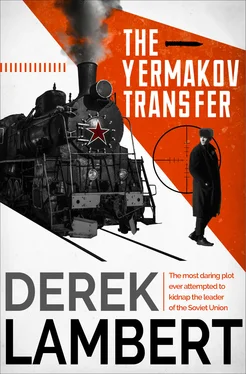* * *
Viktor Pavlov who planned to hold Yermakov to ransom lay on his bunk in the soft-class sleeper with his face close to the sandbag buttocks of the Tartar general’s wife. He doubted at this moment whether the buttocks of Miss World would have aroused him.
From his East German briefcase he took a sheaf of papers covered with the figures and symbols of a scheme to automate the traffic system of Khabarovsk in the Far East of Siberia. To Pavlov, the computerised figures also gave the times agents would board the train, the distance out of Chita that the kidnap would be executed, the wavelengths of the radio messages to be transmitted from five European capitals; the long-range weather forecast and troop deployments east of Irkutsk.
But there was imponderables beyond the computer’s electronic brainpower. For one – a jealous Tartar general who considered his elephantine wife to be irresistible; for another – the arrest of one operator before he had boarded the train (although they had made allowances for casualties); for yet another – the unknown occupant of the bunk above Pavlov. The computer in his brain had allowed for six imponderables.
There were four bunks in the compartment, a small table and lamp, a dearth of space. Pavlov chose the bunk underneath the vacant bunk in case he needed the advantage: he presumed the general had chosen the bunk above his wife in case of some frailty in the structure.
The general’s wife was unpacking a suitcase. Flannel nightdress, striped pyjamas, toilet bag, bottle of Stolichnya vodka, bottle of Armenian brandy, two loaves of black bread, goat’s cheese, four onions and a pistol.
The general, who was in civilian clothes, loosened his tie and said: “Nina, the vodka.” He took a swig, wiped the neck of the bottle and stared at Pavlov in case he had been sexually aroused by a movement of pectoral muscle, a creak of corset. Reassured, he handed the bottle to Pavlov.
Pavlov shook his head. “No thanks.”
The general frowned, stroking his drooping moustache.
An enemy in the compartment, Pavlov decided, was an unnecessary complication, but so was liquor.
The general’s wife began to peel an orange so that, with the vodka, the compartment smelled like a sweet liqueur. Juice spat in Pavlov’s eyes.
He explained: “I’ve got work to do.” Waving the sheaf of papers. “I must have a clear head.” He had learned the wisdom of telling lies which were also the truth.
The general took another swig. “A scientist?” His tone was hopeful because, of the two classes of citizens – The Military and others – scientists ranked highest in the latter. “Nuclear, perhaps?”
“Let’s just say I’m a scientist.” The Military appreciated secrecy.
Pavlov had been screened three times before getting his rail ticket. He had been cleared because he was the leading authority on computers, because he was married to a Heroine of the Soviet Union waiting for him in Siberia, because there was no reference to his Jewishness on his papers.
He returned to his documents while the general unwrapped a mildewed cigar and his wife started eating sunflower seeds, blowing the husks on the floor. There were three agents already on the train, none with JEW on their passports, each with an ineradicable strain of Jewishness in them; each a fanatic, each a possible martyr.
Martial music poured through the loudspeakers as the train picked up speed through the outskirts of Moscow. It became an anthem to which Pavlov supplied the words:
If I forget you, O Jerusalem
let my right hand wither away;
let my tongue cling to the roof of my mouth
if I do not remember you,
if I do not set Jerusalem
above my highest joy.
The door opened and the missing passenger entered. A powerful man with polished cheeks, black hair thinning; built for the outdoors – hunting moose in the taiga , breath frosting the air; incongruous in his dark blue suit, uncomfortable beneath any roof. He breathed fresh air into the compartment, greeted them breezily, said his name was Yosif Gavralin and swung himself into the berth above Pavlov.
Pavlov wondered what rank he held in the K.G.B. He thought he must feel vulnerable in the upper bunk. A single upwards thrust of a knife.
The general sucked unsuccessfully at his cigar. Smoke dribbled from its fractured stem. “Cuban,” he said with disgust, giving it to his wife who squashed it among her sunflower husks.
* * *
In the next compartment, Harry Bridges, an American journalist almost trusted by the Russians, read the carbon copy of the story he had filed that morning to New York via London. He read it without pride.
It was a description of the Communist Party leader’s departure for Siberia which a messenger had taken to their office in a penitentiary-style office block in Kutuzovsky Prospect to telex. It was uninspired, dull and hackneyed. But it would be published because it announced that the paper’s Moscow correspondent, Harold Bridges, was the only Western reporter – apart from correspondents of communist journals like the Morning Star – permitted to cover the Siberian tour.
But at what cost?
From his upper-berth Harry Bridges glanced speculatively at the English girl lying on the lower-berth bunk across the compartment. Somewhere on this train there was a story better than the speeches of which he had advance copies. Any story was better. The girl, perhaps – the only possibility in the compartment they shared with a train-spotter and an Intourist guide. Once Bridges would have looked for stories: these days they were handed to him. Once he would have instinctively asked himself: “What’s a young English girl with a hyphen in her name and fear in her eyes crossing Siberia for?”
No more. There were a lot of answers Harry Bridges didn’t want to find out; so he didn’t ask himself the questions. Just the same old instincts lurked so he smiled at her and asked: “Making the whole trip?”
Bridges’ assessment of Libby Chandler was half right: she didn’t possess a hyphen but she was scared. She nodded. “But not as far as Vladivostock. No foreigners are allowed there, are they?”
“A few.” Bridges didn’t elaborate because he was one of the few allowed inside the port on the Bay of the Golden Horn, a closed city because of its naval installations.
Some said Harry Bridges had sold his soul. He didn’t contradict them; merely reminded himself that his accusers were the correspondents harangued by their offices for missing his exclusives.
A girl attendant knocked on the door to see if they were settled. They said they were but she couldn’t accept this. She tidied their luggage, tested the lamps and windows, distributed copies of Lenin’s speeches. Through the open door came the smell of smoke from the samovar she tended.
Bridges clipped the carbon of his first dispatch into a springback file and consulted the advances. Yermakov attacking the dissidents at Novosibirsk, the Chinese at Irkutsk, the Jews at Khabarovsk.
They’ll have to do better for me than that, Bridges decided. Not only would Tass give the speeches verbatim so that every paper in the States would have stories through A.P. and U.P.I., but the weary rhetoric wasn’t worth publishing. He needed an interview with Yermakov.
He stuck the file under his pillow and lay with his head propped on one hand. In the old days he would have mentally recorded everything in the compartment including the names, occupations and ages of his fellow travellers. He had always done this when flying in case the plane crashed and he was the sole survivor with the story: the names of the crew – in particular the stewardesses – and the credentials of the passenger next to him.
The train-spotter was filling his notebook with figures. The dark-haired Intourist girl with the heavy, sensuous figure was shuffling papers beneath him, rehearsing her recitation for a tour of a hydro-electric plant.
Читать дальше












